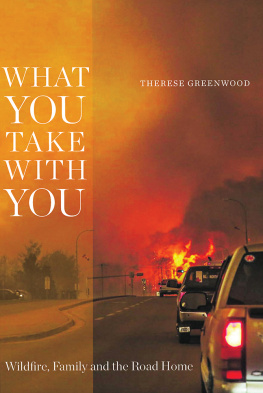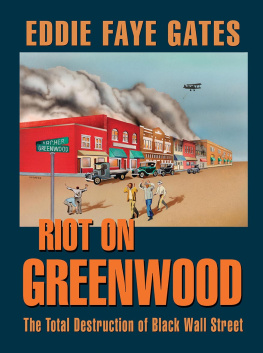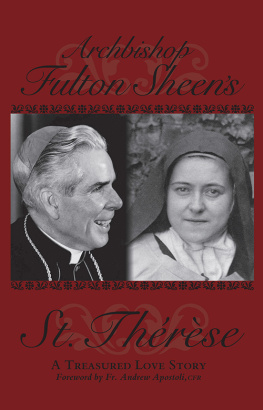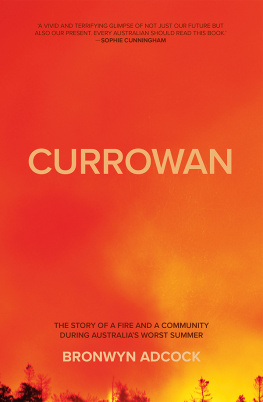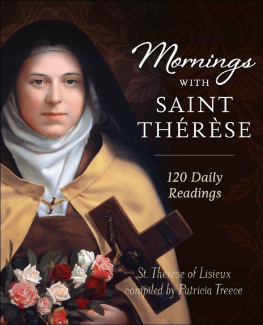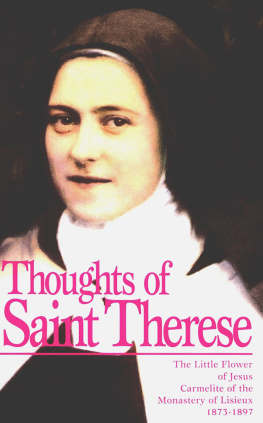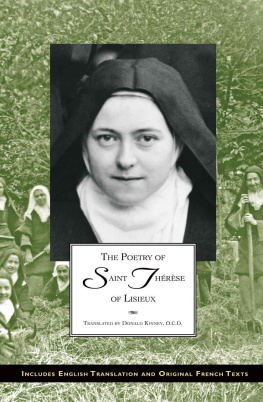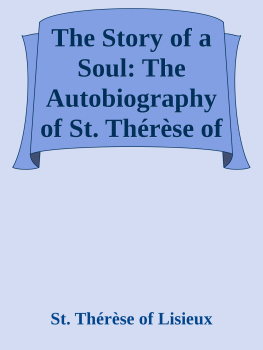Table of Contents
Guide
List of Pages
Published by
The University of Alberta Press
Ring House 2
Edmonton, Alberta, Canada T6G 2E1
www.uap.ualberta.ca
Copyright 2019 Therese Greenwood
LIBRARY AND ARCHIVES CANADA CATALOGUING IN PUBLICATION
Title: What you take with you : wildfire, family and the road home / Therese Greenwood.
Names: Greenwood, Therese, author.
Series: Wayfarer (Edmonton, Alta.)
Description: Series statement: Wayfarer series
Identifiers: Canadiana (print) 20190056541 | Canadiana (ebook) 20190056592 |
ISBN 9781772124491 (softcover) |
ISBN 9781772124712 (PDF) |
ISBN 9781772124699 (EPUB) |
ISBN 9781772124705 (Kindle)
Subjects: LCSH: Greenwood, Therese. | LCSH: WildfiresAlbertaFort McMurrayHistory21st century. | LCSH: WildfiresAlbertaFort McMurrayAnecdotes. | LCSH: Disaster victimsAlbertaFort McMurrayBiography. | LCSH: Disaster reliefAlbertaFort McMurrayAnecdotes.
Classification: LCC SD421.34.C2 G74 2019 | DDC 363.37/8092dc23
First edition, rst printing, 2019.
First electronic edition, 2019.
Digital conversion by Transforma Pvt. Ltd.
Copyediting by Kimmy Beach.
Proofreading by Maya Fowler Sutherland.
Cover design by Alan Brownoff.
All rights reserved. No part of this publication may be reproduced, stored in a retrieval system, or transmitted in any form or by any means (electronic, mechanical, photocopying, recording, or otherwise) without prior written consent. Contact University of Alberta Press for further details.
University of Alberta Press supports copyright. Copyright fuels creativity, encourages diverse voices, promotes free speech, and creates a vibrant culture. Thank you for buying an authorized edition of this book and for complying with the copyright laws by not reproducing, scanning, or distributing any part of it in any form without permission. You are supporting writers and allowing University of Alberta Press to continue to publish books for every reader.
University of Alberta Press gratefully acknowledges the support received for its publishing program from the Government of Canada, the Canada Council for the Arts, and the Government of Alberta through the Alberta Media Fund.

In What You Take With You , Therese Greenwood tells a very personal story of the Fort McMurray Wildfire. By considering the things that she lost in the blaze and the things that were saved, Greenwood takes the reader with her through her own evacuation, the road to safety, the grief that she experienced on losing her home, and the steps to her recovery. It is a beautiful book, sharply observed in the accounting of a disaster that affected the nation, gripping in the particulars of her own journey, and expansive in the questions it poses for us all: How is memory tied to the things weve collected, and what does it mean to make a home?
MIRANDA HILL, author of Sleeping Funny
Therese Greenwoods gripping account of the Fort McMurray wildfire evacuation, the largest and most devastating in Canadian history, is told in the deceptively relaxed manner that often masks true tragedy. Youll read this book with a mounting sense of panic. Youll look around your own house, imagining flames licking at your doors. You have two minutes: what would you save?
WAYNE GRADY, author of Up From Freedom
My eyes filled with tears more than once while reading this book. So terrifying and so tender, it looks clearly and deeply into how we can survive loss and how our treasured objects can be the priceless vessels that carry the stories of both our past and our future.
DIANE SCHOEMPERLEN, author of This Is Not My Life: A Memoir of Love, Prison, and Other Complications
For Steve
They whom we love and lose are no longer where they were before. They are now wherever we are.
SAINT JOHN CHRYSOSTOM
I dont mind a reasonable amount of trouble.
DASHIELL HAMMETT
Contents
Prologue
MY SISTERS AND I grew up afraid we would die in a fire. There were a few reasons we thought our home would burn down and kill us. A few times it almost happenedthe four of us running out into the night in our pajamas, feet crammed into the bedroom slippers we kept lined up on the floor next to us as we slept, tying up the belts to the robes that we hung on our bedposts every night, seeking the shelter of a car.
Much later, an adult living a well-ordered life in a prosperous city in northern Alberta, I no longer kept my slippers where I could find them in the dark. I was a wife, a homeowner, a public servant with a decent history of emergency management training. I thought I had put those childhood days behind me: running through smoke with a pounding heart was over and done with. I didnt even dream about it anymore. I never shared those memories, except with my sisters. Sometimes we would recall random details: a broken pair of glasses, a mans checked flat cap, an album of Christmas music, an old-fashioned crokinole board game, something long in the past. I never thought of writing about it. There was no point stirring up those ashes.
I cant believe I thought those ashes had been smothered, that the embers of my past werent smouldering beneath the undergrowth, ready to burst into flames with the right fuel.
Of course, it was a fire that reignited it. There I was, decades after the first time a fire forced me to run from my home, once again sitting in a car and watching flames move towards the things I loved and towards me. This time, though, it wasnt a domestic tragedy. This time I was fleeing the Fort McMurray wildfire, a fire so great it had its own name: The Beast. I was in the middle of one of the biggest evacuations in the history of the country, hundreds of kilometres from the nearest city and escaping on the only highway out of town.
And I found myself carrying pieces of a past I thought I had let go. That is, until those pieces turned out to be the only things I reached for on my way out the door.
As I ran from my home for the last time, about to spend most of the next fifteen hours inching my way along roads crowded with other families seeking sanctuary, I was travelling in a car I had packed full of ghosts.
| Before
I LOOK AROUND MY HOME, people say to me, and I imagine what I would take if there was a fire.
I heard that a lot after the wildfire in Fort McMurray, when Canadians watched shocking media images of an out-of-control inferno bearing down on a communitymy communityand eighty thousand souls on the one road to safety.
Everyone tells me what they would pack if they were caught in a similar situationusually baby and wedding photos, something sentimental. The younger ones mention laptop computers, hard drives, phones. My phone is my life, they say.
What you think you will pack as you look around your comfortable living room and what you snatch when smoke chokes the air and flames lick the sky are entirely different. The people of Fort McMurray, who bundled their families into oversized pickups and late-model sedans and headed out on the highway towing all-terrain vehicles, boats and campers, tended to treat the random items they grabbed as a joke.
This is typical of the local sense of humoura fierce, proud, self-deprecating wit borrowed from the east coast of Canada, Fort McMurray being the second-largest city in Newfoundland, as the saying goes. Every third person seems to come from The Rock, part of the economic diaspora that, with the downturn in oil prices in the two years before the fire, had started flowing in the opposite direction.

